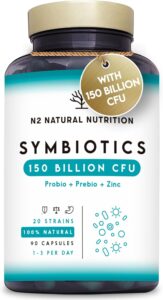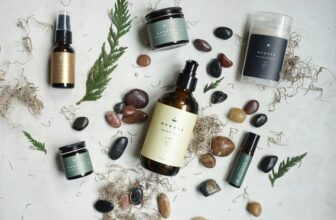Does Probiotics Help Skin? Discover the Benefits for Your Skin Health

Table of Contents
Does Probiotics Help Skin? Unveiling the Benefits
The connection between skin and probiotics has rightly taken center stage in recent years, not least when we consider skin health as a surprising beneficiary of gut health and wellness. A lot of people are asking themselves now, “Does probiotics help skin? The short answer is yes; the longer answer is fascinating and intricate.
Here, we’re digging into the science behind probiotics, how they influence skin health—and tips for adding probiotics into your routine. You’ll come away knowing exactly how probiotics can contribute to both your skin health and holistic wellness.
What Are Probiotics?
Audible Audiobook: Prebiotics, Probiotics and Mental Wellbeing: The Gut-Brain Connection
Probiotics are bacteria and yeasts that are good for you, especially your digestive system. Probiotics: The bacteria found in fermented foods such as yogurt, kefir, sauerkraut, kimchi, and kombucha; it can also be taken as a supplement.
These little minions help maintain the balance of the ecosystem of bacteria in our gut called the gut microbiome. Healthy gut microbiome is important for digestion and immunity, but it can also surprise you with how much it affects the health and appearance of your skin.
The Gut and Skin Connection – Your Guide to Glowing Skin
The gut-skin axis, a communication highway between your gut and your skin, is at the center of the probiotics-skin relationship. This dysbiosis, or imbalance of the gut microbiome, can occur due to poor diet, stress, antibiotics or illness and often results in inflammation — an epidemic in the skin that commonly appears as acne, eczema or rosacea.
That’s where probiotics come in to help restore balance, which has a ripple effect that reaches your skin. Let’s explore how they work:
Reducing Inflammation
Many skin conditions — acne and eczema, for example — are rooted in inflammation. Probiotics generate anti-inflammatory compounds and enhance the integrity of the gut lining, stopping damaging toxins from entering the bloodstream and causing skin flare-ups.
Strengthening the Skin Barrier
Your skin has its own microbiome, a gathering of bacteria, fungi and other microorganisms that protect against harmful pathogens. Probiotics support this ecosystem, aiding in the maintenance of a strong, hydrated and healthy skin barrier.
Balancing Sebum Production
Too much sebum can build up in the pores, resulting in acne. By reducing inflammation and boosting hormonal balance, probiotics assist in regulating this process.
How Probiotics for Skin Health Can Benefit You
With the introduction out of the way, let’s get into the particulars of how probiotics can change your skin.
Clear Skin: How to Treat a Pimple from Inside
Acne is not just a teenage issue; it affects millions. The reasons are diverse, including hormonal imbalances, stress, and gut dysbiosis (an imbalance of gut bacteria).
Probiotics can help by:
Diminishing systemic inflammation which worsens acne.
Limiting oil production; this will help keep pores from becoming clogged.
Beating back the overgrowth of bad bacteria that triggers breakouts.
In a 2017 study published in the American Journal of Clinical Dermatology, participants who took probiotic supplements as a part of their routine had improvements in atopic dermatitis. Similar studies have shown improvements psoriasis and other skin conditions.
Soothing Eczema: Relief for Itchy, Irritated Skin
Eczema is a long-term skin condition that causes red, inflamed, itchy patches of skin. Research shows that probiotics may help by modulating the immune system, dampening the overactive immune responses that lead to eczema flare-ups.
Research suggests that children who take probiotics early on may even be less likely to develop eczema in the first place.
Calmer Complexion: Soothing Rosacea
Rosacea — redness, visible blood vessels and sensitive skin — can be difficult to treat. Probiotics can be beneficial by decreasing the skin’s inflammatory response and fortifying the skin barrier.
To be clear, more research is needed, but anecdotal and even small studies indicate that probiotic skincare products, especially, can help with rosacea symptoms over time.
Increase Hydration for Supple Skin
That most often means a healthy skin barrier, which locks in moisture, not just drinking water for hydrated skin. Probiotics have also been found to help increase skin hydration by enhancing skin ceramide (natural fats and lipids) production, crucial lipids that allow the skin to retain water.
And this equals softer, plumper, younger-looking skin.
Probiotics For Beauty: Other Skin Benefits Of Probiotics
Probiotics go beyond enhancing your skin. Its effects ripple through other areas of beauty:
Less Visible Aging: Probiotics may help diminish signs of aging like fine lines and wrinkles by fighting oxidative stress and inflammation.
How to Add Probiotics to Your Routine
Excited to take advantage of the benefits of probiotics for your skin? Here are three actionable ways to get started:
Eat Your Way to Better Skin
Begin by incorporating probiotic-rich foods into your diet:
Yogurt and Kefir: These fermented dairy products, which are rich in live cultures, can easily be added to dishes.
Kimchi and Sauerkraut: Fermented veggies are packed with probiotics and vitamins supporting skin health.
Kombucha: This tangy fermented tea is a gut microbiome booster that packs a refreshing punch.
Supplement Smartly
If fermented foods aren’t your thing, try taking a high-quality probiotic supplement. Look for:
Many probiotic strains, since diversity matters.
Contains at least 10 billion CFUs (colony-forming units) per serving.
Probiotic supplements can be formulated to address specific concerns, like skin health, digestion or immunity.
Try Probiotic Skincare
Topical probiotics are an increasingly popular trend in the world of beauty, and for the right reasons. These products apply probiotics topically to the skin, which supports balance of the skin microbiome and aids in decreasing irritation.
Look for:
Probiotic Serums: Lightweight and perfect for layering under your moisturizer.
Probiotic Masks: They deliver a high-dose of probiotics for moisturizing and calming the skin.
Personalized Tips for Success
Be Consistent: Probiotics Benefits Take Time. Keep up that regime at least in 8–12 weeks to see visible results.
Pair With Prebiotics: Prebiotics (fiber-rich foods) serve as food for probiotics, making them more beneficial. Good ideas include bananas, garlic, and onions.
Listen to Your Body: Your gut microbiome is different from everyone else’s. Try a few different probiotic strains to see what works best for you.
MYTHS ABOUT PROBIOTICS AND SKIN
Myth No. 1: Probiotics Are a Quick Fix
Although probiotics have the potential to transform skin health, they aren’t a miracle remedy. This takes patience and persistence.
Myth #2: All probiotics are the same
Different strains of probiotics have different uses. Lactobacillus acidophilus, for example, is known to address acne and eczema, while Bifidobacterium breve promotes hydration.
MYTH #3 You don’t need probiotics if you’re healthy
Even if your skin doesn’t seem to have any issues, probiotics can help maintain a well-functioning skin barrier, which will protect the skin, improve hydration and prevent problems in the future.
Conclusion: Do Probiotics Help Skin?
Probiotics are your friendly support for healthy skin. Probiotics are kicking butt in the wild world of skincare, and they’re the real deal in your topical anti-aging regimen. Probiotics promote healthy, beautiful skin from the inside out — by restoring harmony to your gut microbiome, decreasing inflammation, and supporting your skin’s natural barrier.
Just keep in mind, getting that radiant complexion isn’t something you’ll achieve overnight — it’s a long-term commitment. It’s about cultivating a lifestyle that nurtures your body’s natural processes. By adding probiotics to your diet and skincare essentials, you’re not only investing in clearer skin; you’re investing in your well-being.
How will you incorporate probiotics into your regimen? Whether it’s a bowl of yogurt in the morning, a probiotic serum on your skin or a straightforward supplement, small adjustments can yield great results. Try it today and see your skin transform.
Prebiotics, Probiotics and Mental Wellbeing: The Gut-Brain Connection – Kindle eBook









